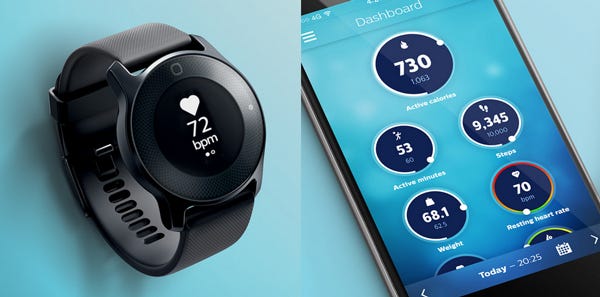September 4, 2015
The Dutch multinational is unveiling a series of health tracking programs that use Philips devices, apps, and cloud-based data analysis.
Chris Newmarker
|
The personal health programs will use devices including the Philips watch, which includes a proprietary optical heart rate sensor and accelerometer. (Image courtesy of Royal Philips) |
Royal Philips is upping its mobile health game when it comes to the new series of personal health programs it is unveiling.
The programs will eventually help people track everything from heart health to back pain, and will each incorporate a package of Philips devices, apps, and the cloud-based Philips HealthSuite Digital Platform. The first program is being unveiled at the Internationale Funkausstellung (IFA), which takes place in Berlin from September 4 to 9.
"Philips is the only technology company with a range of professional and consumer offerings that can combine clinical and personal health data across the health continuum to encourage prevention and healthy living, to speed diagnosis and treatment, and to enable better recovery and home care. Philips personal health programs will help consumers develop healthier habits for life," Pieter Nota, executive vice president and CEO of Personal Health at Royal Philips, said in a news release.
Philips devices being brought into the mix include:
The Philips health watch, which employs a proprietary optical heart rate sensor to continuously measure biometrics including heart rate, activity, and sleep patterns;
The Philips upper arm blood pressure monitor, which is a tubeless, rechargeable device that allows a person to measure their systolic and diastolic blood pressure as well as your heart rate;
The Philips wrist blood pressure monitor, a small device that allows a person to measure systolic and diastolic blood pressure, as well as your heart rate;
The Philips body analysis scale, which measures weight, estimates body fat through bio-impedance analysis, and calculates BMI;
The Philips ear thermometer, which Philips boast can achieve accurate body temperature results in 2 seconds.
The announcement comes as Philips seeks to refocus and turn around its healthcare operations. It previously announced that it even plans to split into two companies focused on HealthTech and Lighting Solutions.
Over the first nine months of 2015, the company's stock was one of the worst performing among large medical device companies. But announcements such as the personal health programs suggest that the company is seeking major innovations to turn the situation around.
Other recent announcements out of Philips include a unique ultrasound system called Lumify that plugs into an Android tablet and utilizes the Philips HealthSuite Digital Platform.
Philips is also collaborating with the Academic Medical Center (Amsterdam, the Netherlands) to engage in a European multi-center clinical study of a minimally invasive treatment for severe diabetic foot complications. And it recently forged a five-year, $25 million alliance with MIT to further research in its core areas of healthcare and lighting solutions.
Learn more about cutting-edge medical devices at MD&M Philadelphia, October 7-8. |
Like what you're reading? Subscribe to our daily e-newsletter.
Chris Newmarker is senior editor of Qmed and MPMN. Follow him on Twitter at @newmarker.
Like what you're reading? Subscribe to our daily e-newsletter.
About the Author(s)
You May Also Like



